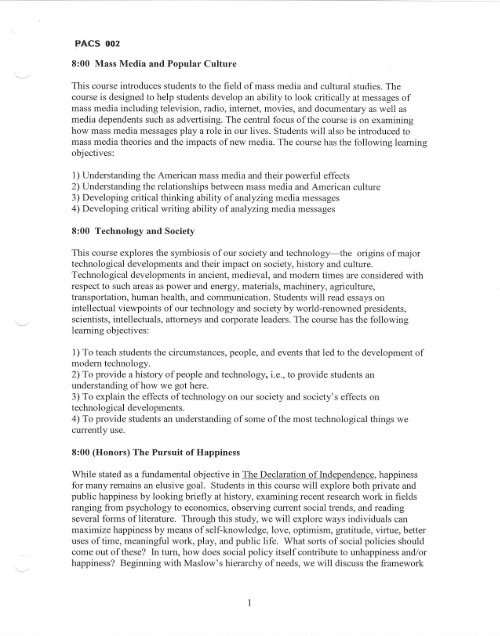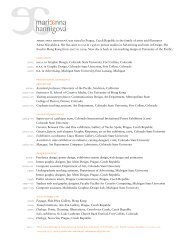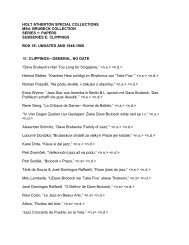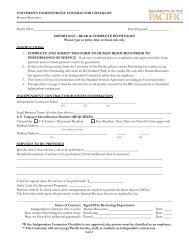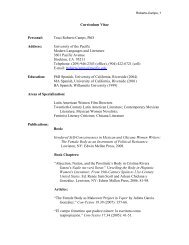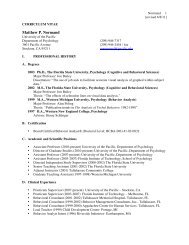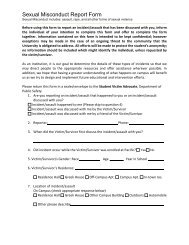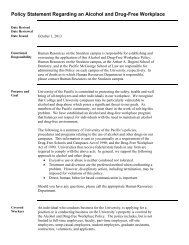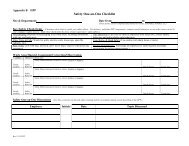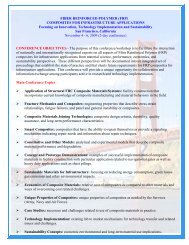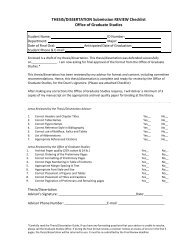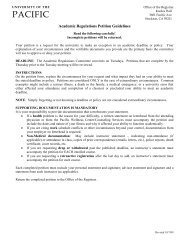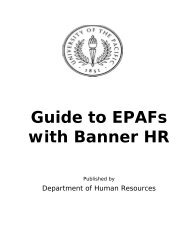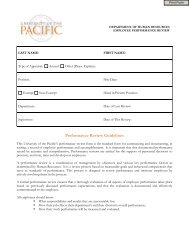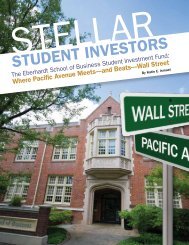PACS 002 8:00 Mass Media and Popular Culture This course ...
PACS 002 8:00 Mass Media and Popular Culture This course ...
PACS 002 8:00 Mass Media and Popular Culture This course ...
Create successful ePaper yourself
Turn your PDF publications into a flip-book with our unique Google optimized e-Paper software.
<strong>PACS</strong> <strong><strong>00</strong>2</strong>8:<strong>00</strong> <strong>Mass</strong> <strong>Media</strong> <strong>and</strong> <strong>Popular</strong> <strong>Culture</strong><strong>This</strong> <strong>course</strong> introduces students to the field of mass media <strong>and</strong> cultural studies. The<strong>course</strong> is designed to help students develop an ability to look critically at messages ofmass media including television, radio, internet, movies, <strong>and</strong> documentary as well asmedia dependents such as advertising. The central focus of the <strong>course</strong> is on examininghow mass media messages playa role in our lives. Students will also be introduced tomass media theories <strong>and</strong> the impacts of new media. The <strong>course</strong> has the following learningobjectives:I) Underst<strong>and</strong>ing the American mass media <strong>and</strong> their powerful effects2) Underst<strong>and</strong>ing the relationships between mass media <strong>and</strong> American culture3) Developing critical thinking ability of analyzing media messages4) Developing critical writing ability of analyzing media messages8:<strong>00</strong> Technology <strong>and</strong> Society<strong>This</strong> <strong>course</strong> explores the symbiosis of our society <strong>and</strong> technology-the origins of majortechnological developments <strong>and</strong> their impact on society, history <strong>and</strong> culture.Technological developments in ancient, medieval, <strong>and</strong> modern times are considered withrespect to such areas as power <strong>and</strong> energy, materials, machinery, agriculture,transportation, human health, <strong>and</strong> communication. Students will read essays onintellectual viewpoints of our technology <strong>and</strong> society by world-renowned presidents,scientists, intellectuals, attorneys <strong>and</strong> corporate leaders. The <strong>course</strong> has the followinglearning objectives:1) To teach students the circumstances, people, <strong>and</strong> events that led to the development ofmodern technology.2) To provide a history of people <strong>and</strong> technology, i.e., to provide students anunderst<strong>and</strong>ing of how we got here.3) To explain the effects oftechnology on our society <strong>and</strong> society's effects ontechnological developments.4) To provide students an underst<strong>and</strong>ing of some of the most technological things wecurrently use.8:<strong>00</strong> (Honors) The Pursuit of HappinessWhile stated as a fundamental objective in The DeclarationofIndependence, happinessfor many remains an elusive goal. Students in this <strong>course</strong> will explore both private <strong>and</strong>public happiness by looking briefly at history, examining recent research work in fieldsranging from psychology to economics, observing current social trends, <strong>and</strong> readingseveral forms of literature. Through this study, we will explore ways individuals canmaximize happiness by means of self-knowledge, love, optimism, gratitude, virtue, betteruses of time, meaningful work, play, <strong>and</strong> public life. What sorts of social policies shouldcome out of these? In turn, how does social policy itself contribute to unhappiness <strong>and</strong>/orhappiness? Beginning with Maslow's hierarchy of needs, we will discuss the framework1
for a personally happy <strong>and</strong> meaningful life. Ending with Sophocles' Oedipus Rex, wewill affinl1 the connection between self-knowledge <strong>and</strong> the common good as enacted inpublic ritual. In addition to the reading, students will keep a personal "happiness"journal, will write a "self-analysis" paper based on their journals, <strong>and</strong> will ultimatelycreate a research paper aimed at redesigning an aspect of contemporary society in orderto maximize happiness. The thematic connection to Pacific Seminar I is primarily toprivate life <strong>and</strong> civil society, but there are also connections to education <strong>and</strong> the rights<strong>and</strong> responsibilities of citizens.8:<strong>00</strong> Lifeways for a Changing WorldUndergraduates beginning their university studies have successfully mastered thepriorities <strong>and</strong> practices of contemporary education in the United States. They can beexpected to bring those same perspectives <strong>and</strong> skills to their gradual mastery of theirchosen disciplines, <strong>and</strong> then carry them on into their future careers. <strong>This</strong> poses a problem.The values <strong>and</strong> assumptions of the global modem industrial world embedded in oureducation system are directly implicated in the pattern of worldwide ecological crisisconfronting human civilization <strong>and</strong> all other life on Earth in the 21 sl century. For thoseconcerned about the future, the wisdom of the world's indigenous peoples, arising from acosmology of interrelatedness <strong>and</strong> rooted in an intimate knowledge of place, is emergingas an indispensable source of hope in the search for ways to transfonn humanity'spresence in <strong>and</strong> to our planetary home. <strong>This</strong> <strong>course</strong> will explore living Native Americantraditions of learning <strong>and</strong> teaching as a means of engaging <strong>and</strong> supporting students in aprocess of inquiry <strong>and</strong> reflection toward a new underst<strong>and</strong>ing of their personal <strong>and</strong> sharedplace in an endangered world <strong>and</strong> an exp<strong>and</strong>ed underst<strong>and</strong>ing of their previous, current<strong>and</strong> continuing education. The instructor specializes in the mutually transfonnativeintegration of "traditional" <strong>and</strong> "modem" curricula, with many years ofIndian Educationprogram development experience in tribal <strong>and</strong> public schools.8:<strong>00</strong> Beatniks, Hippies, <strong>and</strong> Cool<strong>This</strong> <strong>course</strong> investigates the question "What is a Good Society?" through exploration ofthe cultural <strong>and</strong> musical climate in San Francisco, California from 1945 to 1970. Themusical products of this time <strong>and</strong> place were influenced by a worldview that was criticalof the mainstream concept of a "Good Society" <strong>and</strong> played a significant part inexpressing opposition to this view <strong>and</strong> in suggesting alternatives to it. The fonnation ofboth individual <strong>and</strong> group identity in a Good Society will be critically examined throughthe analysis of the ideas of "Beat" poets <strong>and</strong> philosophers, West Coast Jazz, <strong>and</strong>Psychedelic rock music created in, <strong>and</strong> influenced by, San Francisco from 1945 to 1970.8:<strong>00</strong> Economics <strong>and</strong> Social Welfare<strong>This</strong> <strong>course</strong> will focus on contributions economists have about economic organization<strong>and</strong> economic policy in response to the question, "what is a good society?" We will lookat policy on markets-do we get the best results if we let markets run without regulation?When should the government step in <strong>and</strong> regulate markets? What can it do when thereare problems of pollution, scarce resources, ignorant consumers, dangerous conditions,2
<strong>and</strong> collusion? We will look at problems of workers-is society improved by policy ondiscrimination, collective action, <strong>and</strong> minimum wages? Can these problems be bestaddressed locally, nationally or internationally? We will look at problems of entirecountries. What can a country do to develop? Should it protect its own industries orengage in international competition, joining the WTO? We will look at what is the bestmacro-economy. Should policy fight inflation, unemployment or stagnation?8:<strong>00</strong> (Honors) Frankenstein's Dreams<strong>This</strong> <strong>course</strong> will explore the diverse alterations individuals make to their appearance orperformance in an effort to improve their social status. We will also investigate thepotential for science <strong>and</strong> technological innovations to influence the sort of changesindividuals may seek for themselves or their children in the future. The alterations wediscuss may be of a temporary sort, as occurs when athletes consume performanceenhancingdrugs, or permanent, as is the case when parents select for the sex <strong>and</strong> otherphysical characteristics of their offspring. Students will be expected to rigorouslyexplore the potential impacts of such "enhancements" on human interactions <strong>and</strong> thus thestructure of our society. <strong>This</strong> <strong>course</strong> is intended to extend student inquiry from PacificSeminar I into the role of our civil interactions with one another <strong>and</strong> the natural world inthe making of a good society.8:<strong>00</strong> Global Warming: Is it Hot in Here?Is the earth heating up? Is human activity contributing to global climate change? Whyshould we be concerned? What should we do about it? These are questions thatinformed citizens need to be able to answer. The answers to these questions affect how a"good society" operates. The objective of this <strong>course</strong> is to address the science of globalwarming (including the factors that contribute to climate change <strong>and</strong> the evidence forglobal climate change in the past <strong>and</strong> present). In addition we will investigate present<strong>and</strong> future impacts of global warming <strong>and</strong> consider how societies should address theissue. The primary objective is that students will be well enough informed about thescience of global warming to be able determine fact from fiction <strong>and</strong> engage in informeddebate about the policy implications.8:<strong>00</strong> Who Gets What <strong>and</strong> Why?"Most people, of <strong>course</strong>, are aware ofthefact that some people are rich while others arepoor. But people in general are usually less aware of the rather systematic social forcesthat structure such outcomes .... Most people too are aware of the fact that someindividuals have more influence than others, with the power to shape national issues ofwar <strong>and</strong> peace, economic well-being, <strong>and</strong> general social welfare. But, again, people areusually much less aware of how a system of stratification form the basis of suchinfluence." Harold Kerbo, Social Stratification <strong>and</strong> Inequality (2<strong>00</strong>6)Income inequality in the United States has grown since the 1980's. Althoughexperiencing the lowest unemployment rate in decades <strong>and</strong> longest running economic3
expansion, the United States continues to have a greater poverty rate than otherindustrialized nations, even among people who work full-time. Downsizing, outsourcing,lower wages, <strong>and</strong> reduced benefits have led to continued inequality. What has happenedto create this environment? Who is affected by our current state? What can be done tocreate change? In this <strong>course</strong>, social stratification becomes a lens through whichopportunity, life expectancy, health, social position, power, <strong>and</strong> wealth are explored. Theinfluence of social stratification on events such as war, peace, economicexpansion/stagnation, employment, <strong>and</strong> government policy is assessed, leading to adeeper underst<strong>and</strong>ing of social stratification <strong>and</strong> its role within American society.8:<strong>00</strong> The Politics of Punk<strong>This</strong> <strong>course</strong> will explore the ethos of punk rock as it attempts to interrogate, deconstruct<strong>and</strong> ultimately reconstruct the reigning status quo. Punk goes beyond protest in itsattempt to subvert authority that is perceived as corrupt, immoral or misguided. We willutilize readings, music, film excerpts <strong>and</strong> class discussions to develop an underst<strong>and</strong>ingof the punk movement in a historical context as well as its current embodiment in musicsubcultures such as straight edge <strong>and</strong> hard-core punk. Students will do both individual<strong>and</strong> group assignments, which will include writing, research, argumentation <strong>and</strong> a groupproject. We will begin with defining both authority <strong>and</strong> rebellion in a culture <strong>and</strong>consider various critical responses to authority. Students will investigate <strong>and</strong> discuss themoral, ethical, social, cultural <strong>and</strong> legal agendas surrounding the punk movement. The<strong>course</strong> work will blend a combination of the punk DIY approach with a seriousassessment of which elements of the punk agenda are useful in constructing a goodsociety <strong>and</strong> challenging what is perceived as an unjust social, political or culturalestablishment. Creativity will be encouraged in the development of articulate punkmanifestos supporting student's arguments. Ultimately, the class will utilize the punkmovement to teach students how passionate, informed writing (be it music, poetry,speech or essays) can be the vehicle for change when the writer is fully committed to hisor her message.8:<strong>00</strong> Global Politics of the Body<strong>This</strong> seminar focuses on the body. Although so intimate <strong>and</strong> private, our bodies link us toa variety of political, economic, <strong>and</strong> cultural projects. From the notorious eugenicsmovement to more quotidian modes of reproductive control, managing bodies has been afundamental feature of both past <strong>and</strong> present societies around the world. The body is alsoa site where we fiercely claim our sense of ownership <strong>and</strong> define our own identitythrough working out, dieting, piercing, <strong>and</strong> tattooing, to name just a few ways we modify<strong>and</strong> control our bodies. In this seminar, we will use a global comparative framework toexplore how different societies have defined a "good society" through managing thebody. In particular, we will analyze how medicine, in conjunction with the family, thestate, the market, <strong>and</strong> religious <strong>and</strong> educational organizations, has created the normativebody <strong>and</strong> what forms of technology have been deployed in the process. We will alsoexamine how citizens, patients, <strong>and</strong> consumers have sought to improve society throughusing our bodies as sites of activism <strong>and</strong> have both participated in <strong>and</strong> resisted the4
process of creating the normative body, both as individuals <strong>and</strong> as a collective. Coursetopics will include organ transplantation, eugenics, sexuality, reproductive politics, publichealth, <strong>and</strong> epidemics. By focusing on the body, where the public <strong>and</strong> the private meet,this seminar will explore the critical intersection of two major themes introduced inPacific Seminar I, namely, Family & Civil Society <strong>and</strong> Politics, Law & Citizenship.8:<strong>00</strong> Creating Health <strong>and</strong> Well-Being<strong>This</strong> <strong>course</strong> focuses on current thought <strong>and</strong> practices available to consciously create ourideal levels of health <strong>and</strong> well being. It assumes the multi-dimensional nature of "beinghuman" <strong>and</strong> incorporates a holistic perspective for integrating our physical, emotional,mental <strong>and</strong> spiritual "selves". Emphasis is placed on are-conceptualization of health <strong>and</strong>well being, as well as of the mind-body relationship. Major areas explored includealternative health care systems (e.g. acupuncture, biofeedback, homeopathy, naturopathicthought, network chiropractics) <strong>and</strong> various types of energy <strong>and</strong> bodywork (e.g. chakrabalancing, light therapy, massage, reflexology, reiki,). Example topics are:1. Balancing food, herbs, <strong>and</strong> supplements for a healthy lifestyle2. The dynamics of energy, vibration, <strong>and</strong> health/healing3. Specific techniques for consciously creating a life of heath <strong>and</strong> well beingThe <strong>course</strong> format combines readings, discussions, <strong>and</strong> guest speakers. Experientiallearning opportunities represent a significant component in an effort to familiarize thestudent with alternative practices for assuming self-responsibility for health <strong>and</strong> wellbeing.8:<strong>00</strong> Myth Conceptions: Old <strong>and</strong> NewSome people believe we live in a "myth-less" society. They think myths are found amongancient, superstitious, or traditional folk, <strong>and</strong> not among modem, scientific people. <strong>This</strong><strong>course</strong> is founded on the contrary assumption that every society has myths; it isinevitable. Although not presuming to enumerate which myths constitute a good society,the <strong>course</strong> will show that "mythologically-aware" citizens are one of its necessaryingredients. After we consider the parameters of the category "myth," we will readseveral narratives (occasionally with accompanying images) from the Ancient Near East,including the Enuma Elish <strong>and</strong> texts trom the Hebrew Bible, among others. By readingthese ancient myths in their historical context along with their differing versions, we willsee that myths were employed to construct <strong>and</strong> support ancient social identity, culturalprestige, <strong>and</strong> various politico-religious programs. The issues <strong>and</strong> themes we investigate inthe ancient setting will then be used analogically to underst<strong>and</strong> modem manifestations ofmythmaking, especially in America, but also to some extent in other modem socialgroups (e.g., Islamicist movements). Far from static, we will learn that "myth" is anideological battle ground open to contestation, alteration, <strong>and</strong> usurpation. <strong>This</strong> <strong>course</strong>builds on the themes in Pacific Seminar I of Education <strong>and</strong> Authority <strong>and</strong> Politics, Law,<strong>and</strong> Citizenship 1.5
8:<strong>00</strong> Film CensorshipIn this <strong>course</strong>, we will study the history of film censorship around the world in order tounderst<strong>and</strong> how censorship has shaped-<strong>and</strong> continues to shape-the art <strong>and</strong> industry ofmoving images. The <strong>course</strong> will include screenings of important <strong>and</strong> controversialmovies from film history, as well as primary <strong>and</strong> secondary readings that will help us tounderst<strong>and</strong> what makes it on screen <strong>and</strong> what doesn't. We will study foundational texts<strong>and</strong> hot-spots in cinematic history, including the Production Code Administration thatregulated Hollywood films from the 1930s-50s <strong>and</strong> the move to a ratings system in the1960s. Although the first public screening of a motion picture took place in 1895, itwasn't until a 1952 censorship case that the Supreme Court gave film first-amendmentprotection in the United States. How does censorship shape <strong>and</strong> respond to differentcommunities <strong>and</strong> modes of interpretation or reception? Censorship is usually understoodas the repression of content considered sexually or politically dangerous, but Hollywoodalso' censors' itself in other ways to fit accepted genres <strong>and</strong> maximize box officereceipts. Where do we draw the line between political censorship <strong>and</strong> studio decisionsmade to maximize a film's audience base <strong>and</strong> profitability? We will also study the formsof censorship at work in other national or alternative cinemas, including "indie" films <strong>and</strong>films from Latin America, Asia, <strong>and</strong> the Middle East. Students will write a researchpaper about a film controversy of their choice <strong>and</strong> present their findings to the class.8:<strong>00</strong> Is Religion Good for Women?<strong>This</strong> <strong>course</strong> will explore the roots of organized religion <strong>and</strong> its effects on women insociety. Lives of women have been shaped, molded <strong>and</strong> informed by the role womenhave played in religion, from the stories of scripture to the first allowed ordained womanpastor, to those still kept outside the ranks of priesthood. <strong>This</strong> <strong>course</strong> will explore JudeoChristian holy writings to seek out roots of the current system of patriarchy <strong>and</strong> genderroles <strong>and</strong> will continue through the early formation of the Christian church <strong>and</strong> ask "whathappened to the women?" <strong>This</strong> question will guide us as we read primary sources(translated), scholarly commentary <strong>and</strong> exegesis as well as both social <strong>and</strong> culturalevidence of the religious effects on women in their domestic, professional <strong>and</strong> civic lives.Since organized religion often functions as its own form of education, has its owndefinitions of family <strong>and</strong> civil society, has significant effects on politics, <strong>and</strong> implies aview of humans' relation to the natural world, this <strong>course</strong> will refer back to the mainthemes of Pacific Seminar 1.8:<strong>00</strong> (Honors) Crime, Responsibility, PunishmentThe general question motivating this <strong>course</strong> is: How does a good society approachpunishment? Roughly 25,<strong>00</strong>0,<strong>00</strong>0 crimes are documented each year in America. Morethan 2,<strong>00</strong>0,<strong>00</strong>0 people are currently in America's prisons <strong>and</strong> jails. Roughly 1/5th arethere on drug-related charges. Black males are incarcerated at seven times the rate ofwhite males. California alone has more than 30 state prisons, by most accounts allovercrowded; <strong>and</strong> names like San Quentin <strong>and</strong> Folsom - not to mention Alcatraz - areculturally iconic. Recently, the American government has held people in detention6
abroad for multiple years at a time without charge or trial. It is thus no surprise thatwhile philosophical discussion of punishment has literally ancient origins, punishmentremains even today a topic that generates lively philosophical debate. We'll jump intothis debate! Specific questions to be considered include: Is knowingly <strong>and</strong> intentionallybreaking the law ever morally pennissible? Is "retribution" a legitimate justification forpunishment, or is this just a fancy word for morally unworthy lust for revenge? Shouldfactors such as a troubled upbringing, impainnent due to substance abuse, youth, a verylow IQ, or insanity, at least partly excuse a crime? How do powerful philosophicalchallenges to the notion of "free will" bear on punishment? Rather than being"punished," should criminals be "treated" (as if criminality is a kind of "sickness")?What role, if any, should the victim (or victim's loved ones) have in detenniningpunishment? Is capital punishment ever morally justified? What about torture? We'llexplore the issues through literature, film, journalistic pieces, Supreme Court decisions,<strong>and</strong> fascinating readings from the world of philosophy. <strong>This</strong> will all tie into PacificSeminar I discussions on the purpose oflaw <strong>and</strong> government as well as on citizens' rights<strong>and</strong> responsibilities. It is anticipated that a service-learning element of the <strong>course</strong> willinvolve volunteering at a local youth detention center.8:<strong>00</strong> <strong>Culture</strong> <strong>and</strong> Belief"And the world, to each individual, means the part of it with which he comes in contact;his party, his sect, his church, his class of society ...<strong>and</strong> it never troubles him that mereaccident has decided which of these numerous worlds is the object of his reliance. "John Stuart Mill, On LibertyHow does our cultural background influence our beliefs <strong>and</strong> values, <strong>and</strong> thus ourbehavior? Or, to paraphrase Mill, what is our "world" <strong>and</strong> how does it shape us?And how do other "worlds" vary from ours? How do belief systems, values <strong>and</strong>behaviors vary across cultures? <strong>This</strong> class will explore these questions with a three-foldapproach. First, we will look at the "hard facts" <strong>and</strong> examine cross-cultural research,mainly from the fields of psychology <strong>and</strong> anthropology, which has relevance to thequestion of the nature of good social relationships in good societies. Students will learnabout the most commonly studied constructs in cross-cultural research, such asindividualism/collectivism, as well the distinctions between cross-cultural psychology,cultural psychology, <strong>and</strong> indigenous psychologies. Secondly, we will combine those hardfacts with contributions from fiction (literature <strong>and</strong> film) that shed further light on thequestions of cross-cultural differences or similarities. Lastly, we will draw from our ownpersonal experience. The final <strong>course</strong> project will be to develop a personal narrativethismay be the student's own narrative or the narrative of a person of their choosingthatexamines one's beliefs <strong>and</strong> values drawing on the material covered in the class. Wewill also try to invite some guest speakers for a more personal account of cross-culturalexpenences.7
8:<strong>00</strong> (Honors) Peak Oil <strong>and</strong> BeyondIt can be argued that a "Good Society" cannot be achieved without abundant <strong>and</strong>relatively cheap sources of energy. Yet it is the scientific conclusion of many highlyrespected geologists, chemists <strong>and</strong> investment bankers that world oil production will peaksometime during your years in college <strong>and</strong> after that will decline. Yes, you may, indeed,entertain your gr<strong>and</strong>children by describing how a gasoline station looked <strong>and</strong> worked.<strong>This</strong> <strong>course</strong> will objectively examine the world's current total fossil fuel energy reserves<strong>and</strong> production, usage patterns <strong>and</strong> the environmental consequences of the dependence onfossil fuels. We will also compare different predictions about near <strong>and</strong> far-term energyscenarios. Alternative sources of energy such as nuclear <strong>and</strong> non-conventionalhydrocarbons <strong>and</strong> renewable energies such as wind <strong>and</strong> solar photovoltaics will also bestudied. The underlying science <strong>and</strong> the environmental, economic, <strong>and</strong> societal impact ofthe future emergence of each potential energy source will be examined by lecture <strong>and</strong> byreadings. Since governmental policies are critical to development of alternative energysources, teams of four students will research <strong>and</strong> write a group paper advocating changesin government energy policy.8:<strong>00</strong> Buddhist SocietiesBuddhist societies offer us fresh <strong>and</strong> invigorating perspectives on how people should livetogether. Buddhist rulers did not assume their political power in the same way as manyWestern monarchs did, that is they did not rely on force <strong>and</strong> military power, but rather, itwas due to their moral virtues that they rose to high positions in government. <strong>This</strong>attitude toward the government was reflected in how social issues were traditionallyresolved in the Buddhist societies. From criminal justice to suicide, robbery, abortion<strong>and</strong> prostitution, it was always the principle of the ahimsa-causing the least amount ofharm to all parties involved-which has been used to resolve the crisis. In this seminar,we will talk about issues pertaining to underst<strong>and</strong>ing how to organize our societies in abest possible way, <strong>and</strong> by doing so we will raise again most, if not all, of questions fromPacific Seminar 1. However, this time, the answers will come from the greatest Buddhistteachers of Sri Lanka, Thail<strong>and</strong>, China, Tibet <strong>and</strong> Japan <strong>and</strong> the historical lessons whichthese Buddhist societies offer to modem humankind.8:<strong>00</strong> And Justice for AllWhat obligations do citizens owe each other? What obligations does society owe itscitizens? <strong>This</strong> <strong>course</strong> will explore the relationship between the rule of law <strong>and</strong> the goodsociety. The <strong>course</strong> will focus on how the law is organized <strong>and</strong> applied <strong>and</strong> the particularmoral <strong>and</strong> philosophical issues that are raised in the context of legal dispute. Studentswill be encouraged to think through actual legal debates-many of them still alive in thecourts. The <strong>course</strong> will be divided into three sections. The first section will concernobligations which arise under civil law. The second section will cover obligations whicharise under criminal law. The final section of the <strong>course</strong> will concern the obligations thatsociety owes its citizens under constitutional law. Initial discussions on legal practice,legal reasoning, <strong>and</strong> the nature of law are followed by close readings of actual cases.8
Students will also analyze relevant works in philosophy <strong>and</strong> contemporary jurisprudence.In addition to numerous philosophical <strong>and</strong> legal readings, students will analyzesignificant legal cases including Tarasoff v. Regents of University of Cal~fornia, People v.Goetz, Brown v. Board of Education, Korematsu v. United States, Roe v. Wade, <strong>and</strong> manyothers. Students will be evaluated by their ability to apply their knowledge to real worldsituations. They will participate in a group exercises that will be based on resolvinghypothetical problems relevant to the readings. After each section of the <strong>course</strong> there willbe a class debate, mock trial, or formal oral presentation.9


